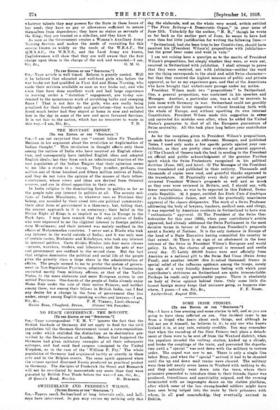day the elaborate, 'and on the whole very sound, article
entitled " The Frcie Zeitung-A Democratic • Organ," in your issue of June 15th. Unluckily for the author, " H. B.," though he wrote as far back as the earlier part of June, he seems to have had even then but little justification for writing the following lines :-
" Switzerland; had she been true to her Constitution, should have received his [President Wilson's] propositions with jubilation— but the great hour came and went in vain."
I am not raising here a question as to the merits of President Wilson's propositions, but simply whether they were, or were not, received in Switzerland with jubilation. I shall attempt to prove that they were received, not with jubilation—neither the word nor the thing corresponds to the staid and solid Swiss character— but that they received -the highest measure of public and private approval, so far as my experience goes, and that of the Americans who have brought that unfortunate passage under my notice.
President Wilson made two ".prepositions" to Switzerland. One, a general proposition, was contained in his speeches and Messages. Another, a particular one, was a call to neutrals to join issue with Germany in war. Switzerland could not possibly have accepted the latter suggestion without breaking faith with the whole of Europe, and without upsetting its own internal Constitution. President Wilson made this suggestion in error and corrected his mistake soon after, when he added the United States's guarantee to that of all the European guarantors of Swiss neutrality. All this took place long before your contributor wrote.
As for the reception given to President Wilson's propositions, as made known through his addresses, Messages, and published Notes, I need only make a few specific points against your con- tributor, as they are pretty clear evidence of general approval. (1) The Church of Geneva took the lead in sending to the President an official and public acknowledgment of the genuine Puritan spirit which the Swiss Protestants recognized in his political doctrine (June, 1917, and later). (2) The Messages of the President were translated and published in their entirety. Thousands and thousands of copies were read, and grateful thanks expressed to the translators. (9) Practically every daily or periodical paper reviewed President Wilson's proposals as well and as much as they ever were reviewed in Britain, and, I should say, with fewer reservations, as was to be expected in this Federal, Demo- cratic Republic. (4) A paper, entitled Les Etats Unis d'Amdrique et in Congderation Suisse, met with the practically unanimous approval of the classes dirigeantes. The work of a Swiss Professor addressing the body of lawyers, teachers, medical men, and clergy, it was reported by American residents in Switzerland to have won " enthusiastic " approval. (5) The President of the Swiss Con- federation for this year (1918), when your contributor's article appeared, had already addressed the Swiss Parliament in the most decisive terms in favour of the American President's proposals anent a Society of Nations. It is the only instance in Europe of the head of a State Executive having committed his country to that extent. (6) There is no sign of an abatement in the keen interest of the Swiss. in President Wilson's European and world policy. In fact, the chorus of approval is resumed and swells every day. (.7) Lately 500,000 francs were sent officially from America as a national gift to the Swiss Red Cross (Swiss Army Fund), and another 500,000 (five hundred thousand) francs in special relief of the influenza epidemic among the troops, surely the sign of a very friendly American feeling with which your contributor's strictures on Switzerland are quite irreconcilable. Perhaps he reads only questionable papers. There is absolutely no body of Swiss opinion behind them. Only some little dis- honest foreign money keeps that nuisance going, as happens else-


























 Previous page
Previous page